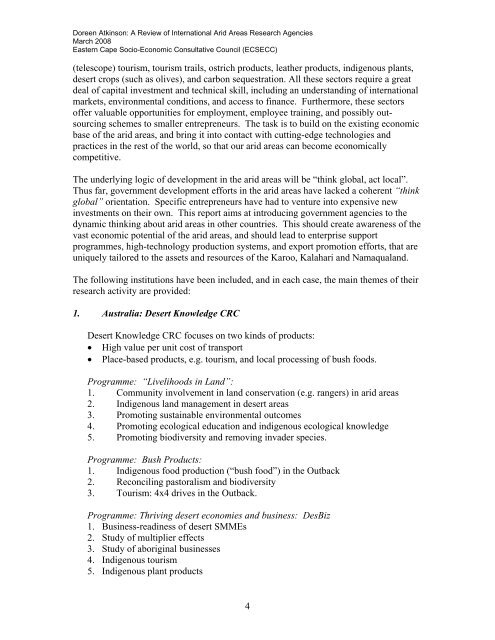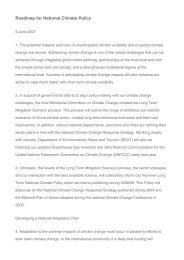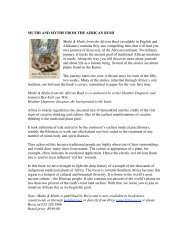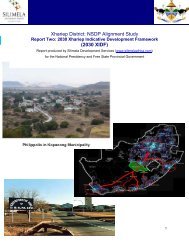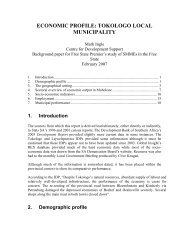report - Arid Areas Programme
report - Arid Areas Programme
report - Arid Areas Programme
You also want an ePaper? Increase the reach of your titles
YUMPU automatically turns print PDFs into web optimized ePapers that Google loves.
Doreen Atkinson: A Review of International <strong>Arid</strong> <strong>Areas</strong> Research Agencies<br />
March 2008<br />
Eastern Cape Socio-Economic Consultative Council (ECSECC)<br />
(telescope) tourism, tourism trails, ostrich products, leather products, indigenous plants,<br />
desert crops (such as olives), and carbon sequestration. All these sectors require a great<br />
deal of capital investment and technical skill, including an understanding of international<br />
markets, environmental conditions, and access to finance. Furthermore, these sectors<br />
offer valuable opportunities for employment, employee training, and possibly outsourcing<br />
schemes to smaller entrepreneurs. The task is to build on the existing economic<br />
base of the arid areas, and bring it into contact with cutting-edge technologies and<br />
practices in the rest of the world, so that our arid areas can become economically<br />
competitive.<br />
The underlying logic of development in the arid areas will be “think global, act local”.<br />
Thus far, government development efforts in the arid areas have lacked a coherent “think<br />
global” orientation. Specific entrepreneurs have had to venture into expensive new<br />
investments on their own. This <strong>report</strong> aims at introducing government agencies to the<br />
dynamic thinking about arid areas in other countries. This should create awareness of the<br />
vast economic potential of the arid areas, and should lead to enterprise support<br />
programmes, high-technology production systems, and export promotion efforts, that are<br />
uniquely tailored to the assets and resources of the Karoo, Kalahari and Namaqualand.<br />
The following institutions have been included, and in each case, the main themes of their<br />
research activity are provided:<br />
1. Australia: Desert Knowledge CRC<br />
Desert Knowledge CRC focuses on two kinds of products:<br />
• High value per unit cost of transport<br />
• Place-based products, e.g. tourism, and local processing of bush foods.<br />
<strong>Programme</strong>: “Livelihoods in Land”:<br />
1. Community involvement in land conservation (e.g. rangers) in arid areas<br />
2. Indigenous land management in desert areas<br />
3. Promoting sustainable environmental outcomes<br />
4. Promoting ecological education and indigenous ecological knowledge<br />
5. Promoting biodiversity and removing invader species.<br />
<strong>Programme</strong>: Bush Products:<br />
1. Indigenous food production (“bush food”) in the Outback<br />
2. Reconciling pastoralism and biodiversity<br />
3. Tourism: 4x4 drives in the Outback.<br />
<strong>Programme</strong>: Thriving desert economies and business: DesBiz<br />
1. Business-readiness of desert SMMEs<br />
2. Study of multiplier effects<br />
3. Study of aboriginal businesses<br />
4. Indigenous tourism<br />
5. Indigenous plant products<br />
4


